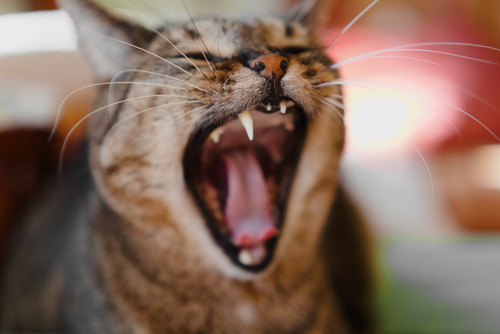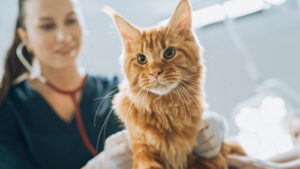Have you noticed your cat has lost a fang tooth? You may wonder how this happened, if it’s painful for your pet, and what steps you should take next. We understand you may be concerned, but our team at Loveland Regional Animal Hospital can help address your cat’s missing tooth and help ensure your pet’s comfort and well-being.
Why Your Cat May Have Lost a Fang Tooth
Cats can lose teeth for several reasons, including trauma, dental disease, and age.
Trauma and Injury
Cats are curious and adventurous, often engaging in activities that might lead to injury. A fall, fight, or accident can cause dental trauma, resulting in a lost fang tooth. If you suspect an injury, monitor your cat for other signs of trauma and seek veterinary attention promptly.
Dental Disease
Plaque and tartar buildup can lead to inflammation, infection, and eventually, tooth loss. Regular dental check-ups and cleanings can help prevent dental disease and maintain your cat’s oral health.
Age-Related Tooth Loss
As cats grow older, their teeth can become weaker and more susceptible to loss. Regular veterinary visits help manage your cat’s dental health and address any issues early on.
What Are Some Symptoms of Dental Issues in Cats?
Recognizing the signs of dental problems can help you catch issues early and provide timely care. If your cat lost a fang tooth, watch for these symptoms:
- Persistent bad breath, or halitosis
- Difficulty eating
- Excessive drooling and pawing at the mouth
Steps to Take If Your Cat Lost a Fang Tooth
Losing a fang tooth is a serious matter and requires appropriate action to ensure your cat’s health and well-being. Here are the steps you should take:
Schedule a Veterinary Appointment
Your veterinarian will conduct a thorough examination to determine the cause of the tooth loss and assess any other dental issues. Call Loveland Regional Animal Hospital at (513) 697-9796 to book your appointment.
Monitor for Signs of Infection
Keep an eye on your cat for signs such as swelling, redness, or discharge around the mouth. If you notice any of these infection symptoms, contact your veterinarian immediately.
Maintain a Soft Diet
While your cat’s mouth heals, providing a soft diet can help minimize discomfort. Offer wet food or moistened dry food to make eating easier for your pet.
How to Prevent Future Dental Issues
Here are some tips to keep your cat’s teeth healthy:
- Regular Dental Check-Ups: Scheduling regular dental check-ups with your veterinarian can help catch issues early and maintain your cat’s oral health. These check-ups are an opportunity for professional cleanings and assessments.
- Home Dental Care: Brushing your cat’s teeth at home can significantly reduce the risk of dental disease. Use a cat-specific toothbrush and toothpaste, and introduce the routine gradually to make it a positive experience for your pet.
Long-Term Implications of Tooth Loss in Cats
If your cat loses their tooth, there are long-term implications to be aware of. Here are some potential consequences:
Impact on Eating Habits
Softening their diet can help, but monitor their eating habits and ensure they maintain a healthy weight.
Potential for Further Dental Issues
Tooth loss can sometimes indicate underlying dental disease, which may lead to further tooth loss if not addressed. Regular veterinary care and dental appointments can help prevent additional problems.
Behavioral Changes
Your cat may become more irritable or withdrawn. Providing appropriate care and monitoring their behavior can help address these issues.
Supporting Your Cat’s Overall Health
Here are some additional tips for maintaining your cat’s health:
- Balanced Diet: Ensure they receive all necessary nutrients to support their dental health and general well-being.
- Regular Vet Visits: These check-ups allow your vet to catch any potential issues early and provide appropriate care.
- Encouraging Safe Play: Encouraging safe play can help prevent injuries that might lead to dental trauma. Provide your cat with safe toys and supervise their playtime to minimize the risk of accidents.
If you have any concerns about your cat’s dental health or need further assistance, contact Loveland Regional Animal Hospital at (513) 697-9796. Our team is here to help ensure your cat’s health and happiness.





